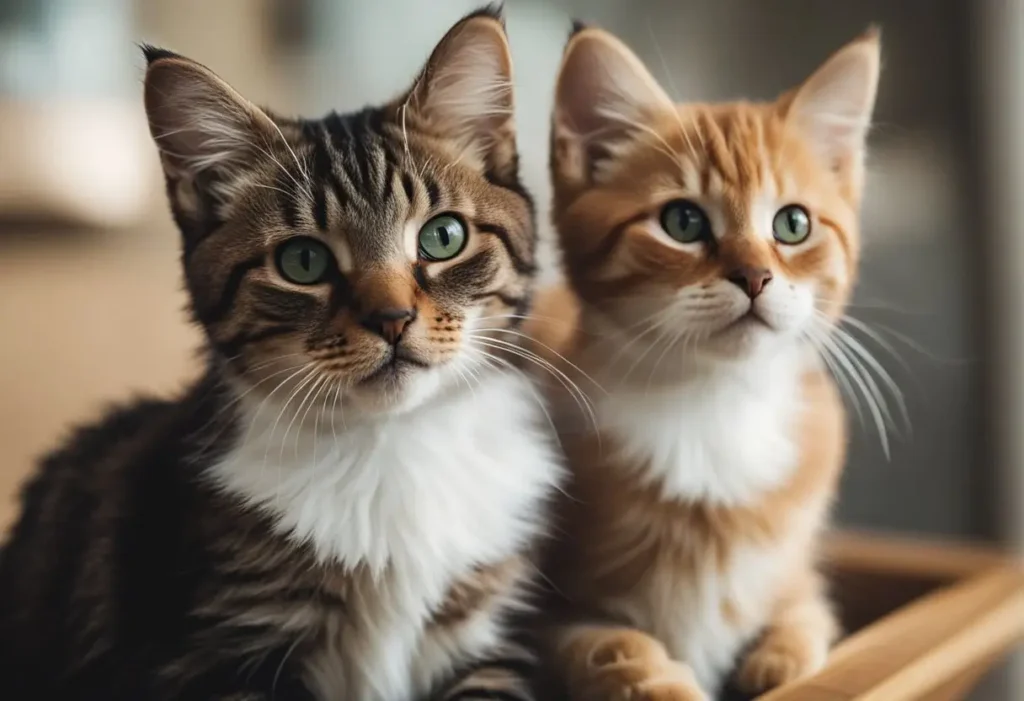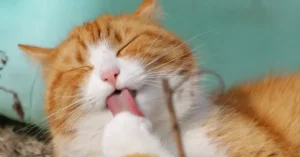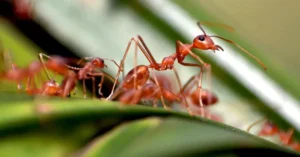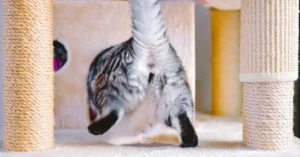When it comes to the question “Can brother and sister cats breed,” most of us have probably wondered if it’s possible. The answer is yes, technically, it is feasible for siblings to mate and produce offspring. However, inbreeding can lead to severe health complications for the resulting kittens, including genetic abnormalities and an increased risk of diseases.
We understand that this topic might stir up different opinions and emotions. That’s why our goal is to provide you with helpful and accurate information to better understand the implications of sibling cats mating. In this article, we’ll be discussing the potential risks and consequences of inbreeding among cats, as well as possible ways to prevent it from happening.
Please keep in mind that the well-being of our feline friends is always our top priority. Thus, being informed about this subject can help us make better decisions when it comes to their care and breeding practices.
Understanding Cat Breeding
As cat lovers, one question that often comes to mind is “can brother and sister cats breed”? Technically, yes, they can mate, but it’s essential to understand the consequences and ethical considerations of breeding closely related cats. In this section, we’ll explore the world of cat breeding and analyze the impact of sibling mating on pedigree, bloodlines, and breed purity.
Cat breeding encompasses various practices, including line breeding, selective breeding, and maintaining breed purity. So have a look at “Can brothers and sister cats breed?” breeders typically aim to enhance desirable traits in pedigree breeds while minimizing genetic defects. Breeding closely related cats, like siblings, is called inbreeding. While it may seem like an easy way to preserve specific attributes, inbreeding can pose significant risks to both the breeding pair and their offspring.
Inbreeding can lead to a higher likelihood of genetic defects and mutations. This results from the reduced genetic diversity that occurs when close relatives mate. Some common health issues in inbred cats include:
- Physical deformities
- Congenital diseases
- Reduced lifespan
- Compromised immune systems
To minimize these risks at “Can brother and sister cats breed?”, responsible breeders follow certain principles:
- Maintain a diverse gene pool by avoiding mating of close relatives.
- Regularly screen for genetic disorders before breeding.
- Provide proper prenatal and postnatal care for the breeding pair and kittens.
For those interested in pedigree breeds, it’s especially crucial to emphasize breed purity without compromising the cats’ health. Some breeders use line breeding, a more controlled form of inbreeding that mates cats having a common ancestor but not siblings. Line breeding can maintain specific traits while reducing the likelihood of genetic defects.
So say can brother and sister cats breed, there is a risk to the offspring’s health due to inbreeding. By understanding the principles of cat breeding and making informed decisions, we can work together to maintain healthy, diverse, and robust feline communities.
Cat Sibling Mating Process
We often get asked, “Can brother and sister cats breed?” To help clarify this topic, we’ll dive into the mating process of cats, specifically focusing on sibling cats.
Sexual Maturity in Cats
Please know that if we ask “Can brother and sister cats breed?”, whether they are siblings or not, can start breeding once they reach puberty. On average, female cats reach sexual maturity at around 6 months, while male cats usually become sexually mature at 8-10 months. However, these timeframes may vary depending on factors such as breed and living conditions. Sexual maturity in feral or outdoor cats may occur earlier than in indoor cats.
The estrus cycle in female cats is when they are most receptive to mating. This occurs periodically until the cat is successfully mated or spayed.
Feline Copulation
Can brother and sister cats Breed? When the female cat is in estrus, it’s common for male cats, including her brother or half-sibling, to display mating behavior, such as fighting for her attention or pursuing her. Male cats are often indiscriminate creatures when it comes to mating, so they won’t shy away from attempting to mate with their sister.
During copulation, the male grips the female by the neck and mounts her from behind. It may take several attempts for a successful mating to take place. Given that both the brother and sister cats are sexually mature, it is indeed possible for them to produce offspring.
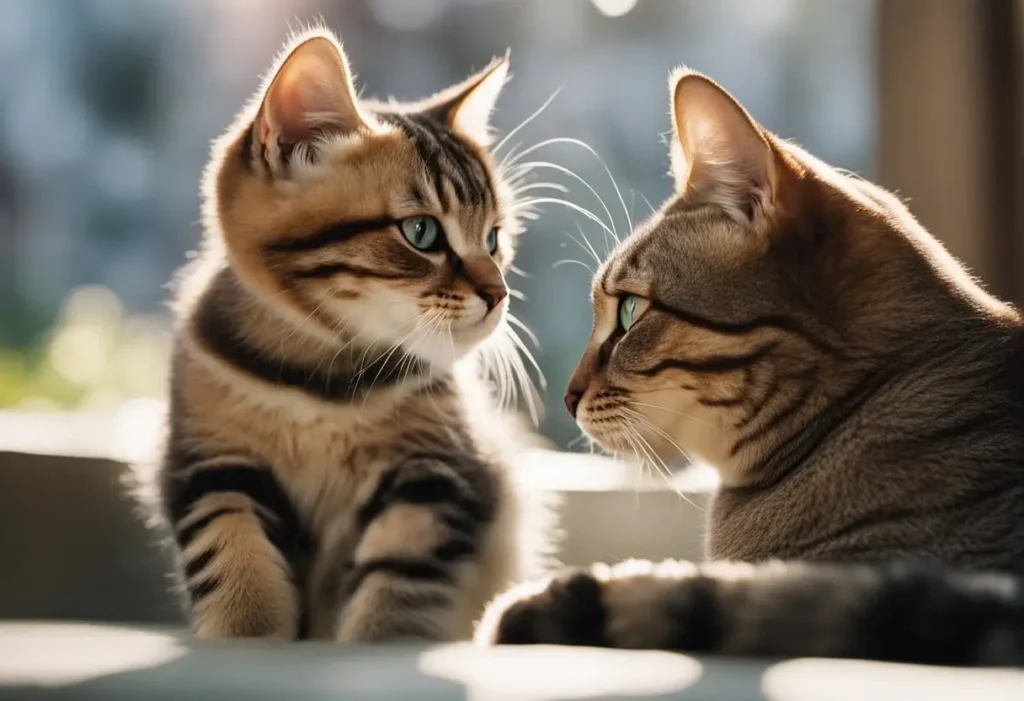
Possible Outcome of Feline Sibling Mating
Can brother and sister cats breed, their offspring may face some potential consequences due to the close genetic relationship. Inbreeding increases the chances of the kittens inheriting genetic defects or diseases as the gene pool is much more limited.
Since fertility rates are related to genetics, it is also possible that the kittens produced from the mating of sibling cats may have lower fertility rates compared to non-sibling cats. Furthermore, the litter size can be affected, and it is common to see smaller litter sizes in closely related cat pairs.
You need to know that if we ask “Can brother and sister cats breed?”, it’s possible and produce offspring, but it’s essential to be aware of the potential risks associated with such mating. Spaying and neutering can help prevent unwanted pregnancies and reduce the risks associated with inbreeding.
Consequences of Inbreeding Cats
We’ve all wondered at some point, “Can brother and sister cats breed?” Well, they can, but it comes with potential consequences. In this section, we’ll discuss the various aspects of inbreeding cats, such as health complications and genetic challenges.
Understanding Inbreeding
Inbreeding occurs when closely related animals, like feline siblings, mate. This practice reduces genetic diversity and can lead to several undesired inherited diseases. Some breeders may use inbreeding to preserve specific desirable traits. However, there are many risks associated with inbreeding, including health complications and genetic disorders.
Health Complications from Inbreeding
- Weakened immune system: Inbred cats may have a higher risk of immune deficiencies, making them more susceptible to infections and illnesses.
- Abnormalities and deformities: Inbreeding increases the chances of skeletal deformities and other physical abnormalities.
- Congenital defects: Inbred cats may suffer from congenital defects due to a higher likelihood of inheriting abnormal genes.
- Inbreeding depression: When the gene pool is limited, cats may experience inbreeding depression – a decline in overall health and reproductive success.
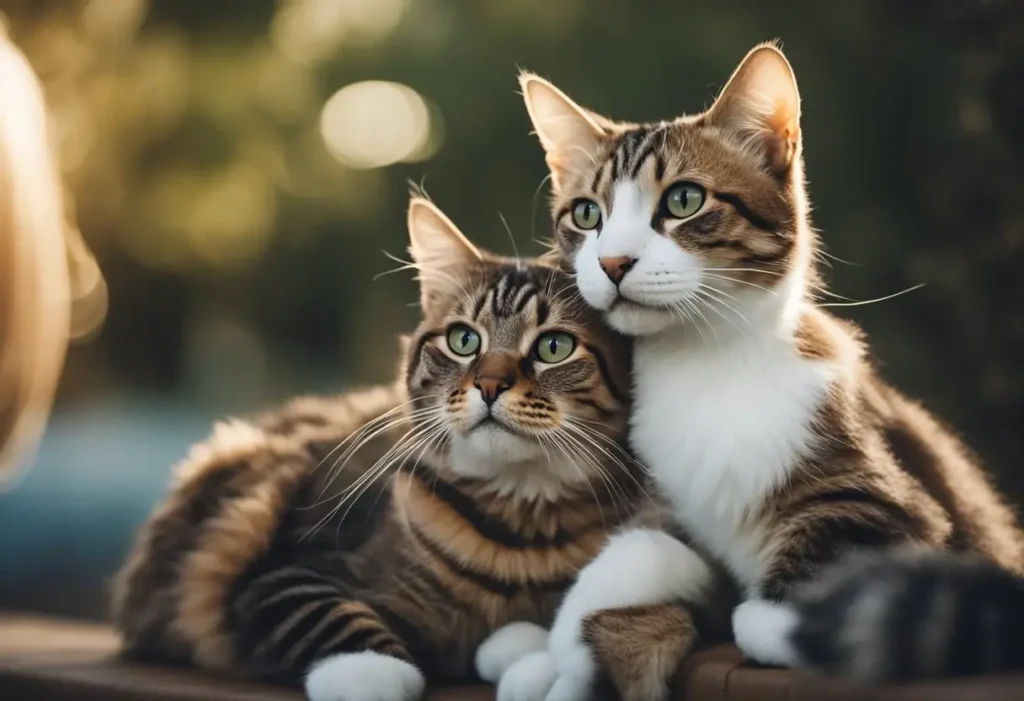
Genetic Challenges in Inbreeding
In breeding feline siblings, there’s a higher chance that harmful recessive traits will surface:
- Reduced genetic diversity: Inbreeding cats results in a limited gene pool, reducing their ability to adapt to changes in their environment.
- Genetic disorders: Inbred cats may inherit genetic diseases caused by abnormal genes passed down from both parents.
- Difficulty in preserving traits: While inbreeding can sometimes help preserve desirable traits, it may also lead to the manifestation of unwanted physical and personality traits.
Neutering sibling cats before they reach puberty is an effective way to prevent accidental inbreeding. This ensures that the kittens won’t inherit any potential health issues or genetic disorders resulting from inbreeding. By understanding the risks and consequences of inbreeding, we can make informed decisions for the well-being of our feline friends.
Preventing Inbreeding Among Cats
When it comes to the question of whether can brother and sister cats breed, the answer is technically yes, but it’s essential to understand the risks and preventive measures. Inbreeding among cats can lead to genetic issues and health problems. In this section, we’ll discuss various ways to prevent inbreeding in cats, including neutering and spaying, outcrossing, and avoiding overbreeding.
Neutering and Spaying
One of the most effective ways to prevent inbreeding among cats, especially siblings, is to have them neutered or spayed. Neutering is the process of removing a male cat’s testicles while spaying involves removing a female cat’s ovaries and uterus. These procedures ensure that cats cannot reproduce, thus eliminating the risk of related cats breeding and producing offspring with potential birth defects or physical defects. It’s recommended to spay or neuter cats before they reach six months old, as this is when they typically become sexually mature and more likely to breed.
Outcrossing
Can brother and sister cats Breed? Another method to prevent inbreeding and maintain genetic diversity in cat bloodlines is outcrossing. Outcrossing involves breeding unrelated cats, which helps reduce the chances of congenital issues and increases overall genetic diversity. By selecting mates with different genetic backgrounds, breeders can ensure that the offspring will have a healthier and more robust genetic makeup.
Avoiding Overbreeding
Lastly, avoiding overbreeding is crucial for the overall health and morality of cats in general. Overbreeding can lead to a lack of available homes for cats, which in turn results in more stray and homeless cats, and ultimately, more inbreeding. By limiting the number of litters a female cat produces and ensuring responsible breeding practices, we can prevent inbreeding and protect the well-being of our feline companions.
By following these measures, we can reduce the likelihood of inbreeding in cats and ensure that our furry friends lead healthier lives. Remember, prevention is key, and being responsible cat owners and breeders will make a significant difference in the lives of our feline friends.
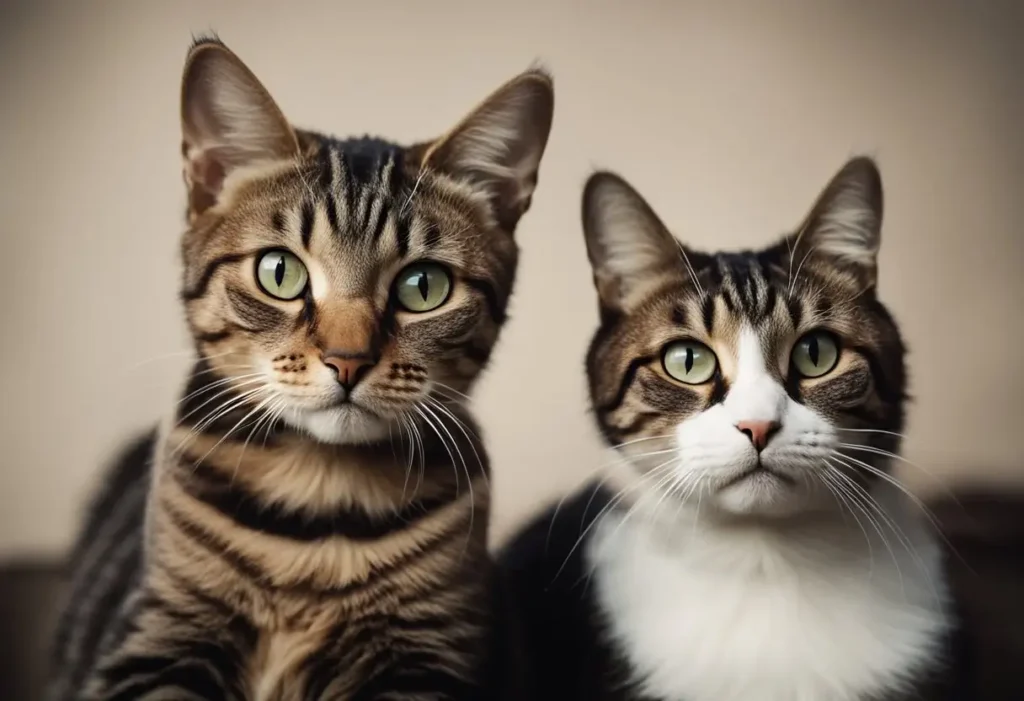
What We Think About Can Brother and Sister Cats Breed
Can brother and sister cats breed? Many cat owners and animal enthusiasts ponder this question. In this article, we share our thoughts on this topic while exploring some of the potential consequences and considerations.
Like we said it is technically possible for sibling cats to mate and produce offspring. However, this is not advisable due to the potential genetic complications. Inbreeding can lead to an increased risk of:
- Genetic abnormalities: The shallow gene pool in closely related cats can result in physical deformities.
- Health issues: Inbred cats are more prone to various diseases due to a weakened immune system.
- Congenital defects: The likelihood of birth defects also increases with inbreeding.
We believe that responsible pet ownership should prioritize maintaining the health and well-being of our feline friends. By avoiding inbreeding, we can help ensure that kittens are born with fewer potential health problems, making them more likely to lead happy, healthy lives.
In some cases, cat breeders may unintentionally breed siblings due to a limited number of cats within certain breeds. To avoid such accidents, it’s essential to monitor and manage the relationships between cats under your care. This can be achieved by:
- Separating male and female siblings as they reach sexual maturity.
- Neutering and spaying pets to prevent unwanted pregnancies and reduce the urge to mate.
- Keeping detailed records of your cats’ lineage to avoid mating closely related individuals.
Can brother and sister cats breed? While it is biologically possible, the potential risks and health complications make it inadvisable. As responsible pet owners and breeders, we should strive to prevent inbreeding and promote the long-term health and welfare of cats.
FAQ: Can Brother and Sister Cats Breed?
Is it okay to breed sibling cats?
Although it is technically feasible for sibling cats to mate and produce offspring, it is strongly discouraged. Inbreeding can result in severe health complications for the kittens, including genetic abnormalities and an increased risk of diseases 1. So, it is better to avoid breeding brother and sister cats to ensure the health and well-being of their offspring.
Do cats know they are siblings?
Cats might not have the same understanding of familial relationships as humans, but they can recognize each other’s scents and behaviors. Sibling cats that have been raised together may develop a strong bond and familiarity with each other. However, this does not prevent them from mating when they reach reproductive age, which is why it’s essential to take precautions to avoid inbreeding.
Will inbred kittens survive?
Inbred kittens can survive, but they are more likely to face several health issues due to genetic defects and increased chances of congenital diseases from inbreeding. While some inbred kittens may live relatively normal lives, others might struggle with physical deformities or health issues that could diminish their quality of life. It’s crucial to take responsible steps to minimize inbreeding within the feline population.
If you also would like to know something about the oldest cat breed have a look at our article.
If you are interested in special breeds like some with white fur and blue eyes it would be a pleasure if you read our article.
What are your thoughts about can brother and sister cat breed? Let us know in the comments.

